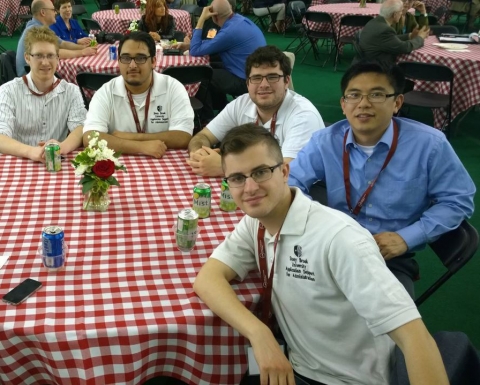March 26, 2015
The new Exam Proctoring System helps students taking online classes to easily schedule exams at nearby SUNY-approved test centers.
By Will Welch, '16
Open SUNY announced a new online tool last month that makes it easier than ever for students taking online courses to find nearby test centers. It is called the SUNY Exam Proctoring System, and it was developed by Stony Brook’s own University Information Systems (UIS) Applications Solutions team in the Division of Information Technology.
The new system allows students to find SUNY-approved test centers in their area and register for exams in a matter of minutes. If there isn’t a test center near the student, he or she can quickly suggest a new test center for approval, doing away with the time-consuming process of manually scheduling exams, and making it easier for SUNY’s online progams to grow. ramsb
One of the programs that will benefit from the system is Stony Brook’s Biology Online Program.
“We will be able to address the needs of more students taking our courses from remote locations, yet insure the academic integrity and fairness of the content and assessment of learning for all our online courses for all students,” said Joanne Souza, director of the online biology program.
It was Souza who brought up the need for a better proctoring system to Patricia Aceves, Stony Brook’s Faculty Center Director. In March 2013, Souza, Professor Paul Bingham, and Aceves co-wrote an application for a SUNY Innovative Instruction Technology Grant (IITG) to build an online system. Although the application did not fit the current grant period, they were later contacted by the SUNY Associate Provost for Academic Technologies and Information Services, who offered advanced funding for the project under the 2013-14 grant period.
“The process of locating a proctor outside of an institution is very manual and labor intensive, so this system benefits faculty offering online courses throughout the SUNY system,” Aceves said.

Once the funding was secured, University Information Systems was selected to develop the new application. The system was built by three computer science students working on the Application Solutions team: Jonathan Rodriguez, Nicholas Branzburg and Daniel Fourman.
Each student worked on a portion of the project directed at a different audience -- students, the University, and test centers. They also gained valuable experience working as a team to deliver the final project using the Microsoft ASP.NET framework, a tool which they all use in their current jobs.“We always want students to be able to leave with something that is meaningful, something that is challenging and also has a positive impact on the University,” said Raymond Chan, UIS Director of Application Solutions. “I thought this application was a perfect fit for these students who were graduating.”
Rodriguez is now a software engineer at ERP Maestro, Fourman is a technology analyst at Citigroup and Branzburg is a software engineer at FactSet Research Systems.
After graduating in May, the team reunited later in the month to present the new system at the SUNY Conference on Instructional Technology (CIT). However, they overcame major challenges to do so when they learned the database was down the night before the presentation. Working late into the morning, the team was able to recreate and re-populate the database on a new server. “Because of the team's effort, the presentation went as planned,” Chan said.
Students Kristen Stewart and Bikramaditya Ghosh Dastidar carried on the torch after the first team graduated to prepare the proctoring system to launch this year. Student Tonian Lamont, working with the Biology Online Program, contacted potential remote test center sites to be included at launch.
Now that phase one of the application is complete and live, phase two will involve other SUNY schools adding support for their classes to the system. The application is currently hosted on Stony Brook’s servers, but it will later be moved to SUNY’s infrastructure where it will continue to support hundreds of online classes.
No comments:
Post a Comment